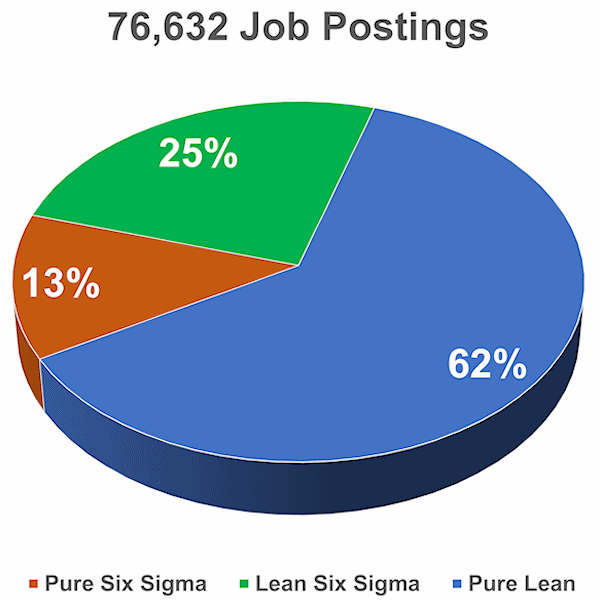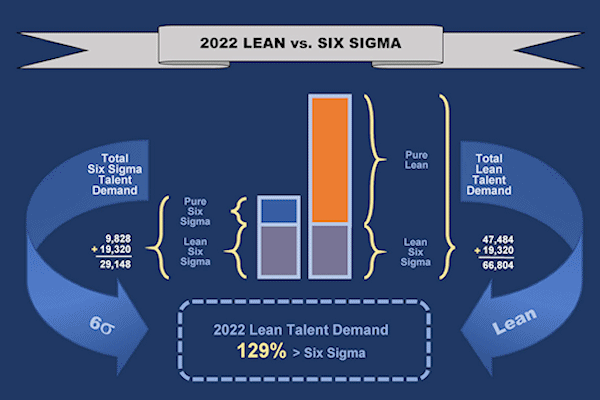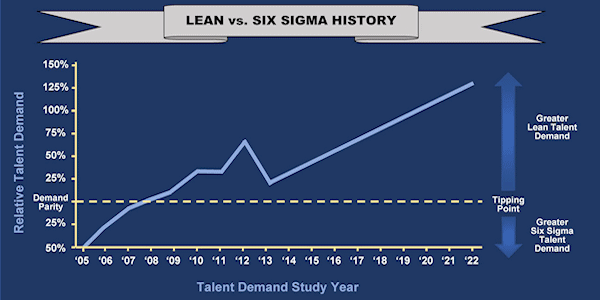Research from The Avery Point Group
Reading the Job Postings
Job postings can tell you a lot about the state of the economy. They can also tell you about the competition between Lean and Six Sigma for recognition as the #1 and #2 organizational improvement programs. Recent research from experts in the field provides very interesting food for thought concerning the demand for Lean and Six Sigma skills.
Executive search and recruiting firm, The Avery Point Group (APG) has reported the findings of their new study focused on the content from a wide collection of major internet job board postings. Their scope included the analysis of 76,632 job postings. The study found ongoing robust demand for continuous improvement skills overall, with Six Sigma talent demand showing further signs of waning relative to Lean. This trend has accelerated since the firm’s 2008 study, when Lean first eclipsed Six Sigma as the more desired skill set. And most dramatically, this is a major shift away from the Six Sigma talent demand dominance found in their first study completed in 2005.
Let’s look closer at what is happening with the demand for Lean and Six Sigma talent.

“Research from The Point Avery Group demonstrates support for Lean as the number one organizational improvement program.”
– Thom Mandl, Chief Operating Officer, Muller Technology
Six Sigma Drops and Lean Soars
APG recently found the demand for job postings looking exclusively for Six Sigma skills, with no mention of Lean in the job specification, plummeted to only 13%. This is down from 27% in their last talent demand study in 2013. A deeper review of this year’s data also shows Six Sigma became a much weaker requirement, even within Lean job postings as well.
The most recent study found that job postings seeking Lean skills, with no mention of Six Sigma, leaped to 62%. This is up from 41% found in the corresponding APG talent demand study from 2013. When comparing the overall demand between desired skill sets, Lean skills exceeded Six Sigma by a whopping 129%. This is, by far, the largest margin ever seen in the firm’s 17 years of talent demand studies.
In APG’s 2013 talent study, 43% of the Lean jobs posted also sought candidates with a Six Sigma skill set. But today, that requirement has plummeted to only 29%, further indicating Six Sigma’s once-dominant stance within continuous improvement continues to fade.
Postings seeking both Lean and Six Sigma, or the term Lean Six Sigma, came in at 25%. This may reflect organizations which have not really committed to an improvement program. For more on what this might mean, see: What is Lean Six Sigma?


What’s Going On?
Tim Noble, managing principal and partner of APG, points to several factors that may be driving the surge for Lean talent and the waning demand for Six Sigma:
- Companies continue to be even more focused on hiring a pure Lean skill set they feel will enhance their existing continuous improvement needs. Companies are opting to consolidate their limited resources around a Lean Transformation as a hedge against the challenges of today’s economic climate. Many feel they are better served by Lean’s more immediate and practical focus on waste, flow, and flexibility.
- Companies also find their Lean journeys are still in need of further maturation and development, necessitating a continued need for skilled Lean talent. In addition, some companies have underestimated what it takes from a time and talent perspective to shift their Lean initiatives from a tools-based approach to one where Lean is fully embedded into their operating culture.
- Right or wrong, many companies continue to focus their initial and ongoing continuous improvement efforts on leaning out their operations by first eliminating waste, putting standard work in place, improving flow, and increasing throughput. They will delay focusing on reducing process variation and leveraging more of a Six Sigma approach. Although some companies have a well-integrated approach, most are continuing to focus on the initial lean-centric side of the equation.
- Poor quality Six Sigma talent has damaged the appetite for hiring those with Six Sigma belts. “As a downside to the waning demand for Six Sigma skills, we are starting to see some candidates who struggle to demonstrate the knowledge needed to fill a client’s key Six Sigma needs when it comes to our technical assessments – even though a candidate may have been trained and certified as a black belt or master black belt,” said Noble. “We find this is usually driven by the lack of recent on-the-job use of these skills by candidates, given the continued shift toward Lean. In some cases, it is also due to the poor training some candidates received from the plethora of Six Sigma training and certification companies which exist today. As a result, these poor training sources do great harm to both candidates’ credibility and the perception of Six Sigma as a skill set in the market.”


What’s Coming Next?
While these talent demand trends signal the continued shift to Lean skills, they do not spell the demise of Six Sigma as a factor in continuous improvement efforts.
Noble notes how “Six Sigma has a very important place in continuous improvement where it can be leveraged to solve complex systemic process problems by targeting process variation, process yield, and to gain a better understanding of the input factors which drive overall performance and capability.”
In terms of Lean, holding onto the title of world champion is never an easy task. Recent supply chain failures, during the Covid-19 pandemic, have raised an alarm. Mike Loughrin, from Transformance Advisors, notes how “many organizations used Lean tools for cost cutting and ignored the need for flexibility with a focus on customer value. Job postings seeking Lean talent to create a sustainable organization, via a Lean Transformation, is the correct approach. Job postings seeking Lean talent for chaotic cost cutting, has been, and will remain the wrong approach.”

“The overall foundation of continuous improvement should be viewed as a collection of complementary tools which integrates both Lean and Six Sigma.”
– Tim Noble, President & Managing Partner, The Avery Point Group
Summary
The demand for Lean and Six Sigma talent, via job postings, is a strong indicator of the state of organizational improvement programs.
76,632 job postings is just a sample. But it is a sample which reveals Lean Transformation is clearly winning the race and is the current world champion.
The research by The Avery Point Group provides validation to those who have been learning and practicing their Lean skills. It should provide a nudge to those who have been investing in Six Sigma.

About The Avery Point Group

The Avery Point Group (APG) is a global executive search and recruiting firm that assists companies in identifying, assessing, and recruiting mid-level management to senior executive transformation leadership talent. APG leverages principals over 60 years of executive business transformation and staffing experience to provide the highest quality retained and contingent executive search services.
APG provides functional expertise and executive search focus in the areas of Six Sigma, Lean, and Operations. Their practice services a wide spectrum of industries including manufacturing, distribution, private equity, and transactionally focused, service-based global companies.
Learn more at: The Avery Point Group.
What is Lean?
What is Six Sigma?
What is the Credential Registry?
Top Reasons to Earn a Certification
Improvement Program Assessment
Subscribe to our newsletter
References
Find Lean and Six Sigma jobs at Jooble
Press Release from The Avery Point Group
Lean Talent Wins Over Six Sigma Skills from Industry Week
Problem-solving Skills Top Attributes Employers Seek on Resumes from National Association of Colleges and Employers
